

Jobvite Social Recruiting Software & Applicant Tracking. Full of thought leadership articles, hiring trends e-books, workbooks and white papers, our library was created to give you the tools you'll need to build a business case for using Jobvite. If there is something you would like to know more about but isn't here, please contact us. eBooks Metrics That Matter: 4 Ways to Prove Your Worth In the second book of our Insight4theEnterprise series, Jobvite explores four important steps that can help recruiters identify, visualize, and consistently deliver the metrics that matter most to the business.
Historically, metrics have been something of a gray area—where recruiters have had difficulty comparing apples to apples, and communicating results has been tedious. Download. Tweeting and profiling your way to a job.
Why Social Media Matters. Job boards may soon become a thing of the past.
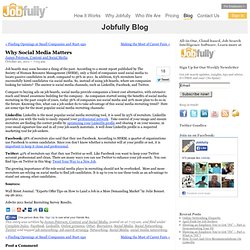
According to a recent report published by The Society of Human Resource Management (SHRM), only a third of companies used social media to locate passive candidates in 2008, compared to 56% in 2011. In addition, 63% recruiters have successfully hired candidates via social media. So, instead of using job boards, where are companies looking for talents? The answer is social media channels, such as LinkedIn, Facebook, and Twitter. Compare to buying ads on job boards, social media provide companies a lower cost alternative, with extensive reach and brand awareness building for the company. More Employers Using Social Media to Hunt for Talent.
Your Next Job Depends On What Google Says About You – Are You Prepared? Are you prepared that Google might determine if you get your next job?
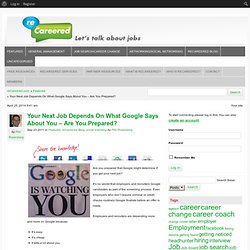
It’s no secret that employers and recruiters Google candidates as part of the screening process. Even employers who don’t require criminal or credit checks routinely Google finalists before an offer is made. Employers and recruiters are depending more and more on Google because: It’s easyIt’s cheapIt tells a lot about you This article from TheLadders talks about Google catching inaccuracies. The Huge Gap Between Candidate Expectations And Employer Reality In Social Media. CC Image by Al_HikesAZ The article “Should You Search Social Media Sites for Job Candidate Information?”
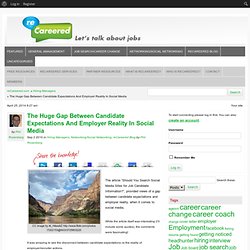
, provided views of a gap between candidate expectations and employer reality, when it comes to social media. While the article itself was interesting (I’ll include some quotes), the comments were fascinating! It was amazing to see the disconnect between candidate expectations vs the reality of employer/recruiter actions. History of Linkedin. OMG! You Mean Recruiters Really Do Screen Candidates Using Social Media? Social Media Won't Transform Corporate Recruiting Unless It Grows Up. The rules of social recruiting. Chances are you are already familiar with social networks as tools for keeping in touch with friends, or to broadcast your thoughts.
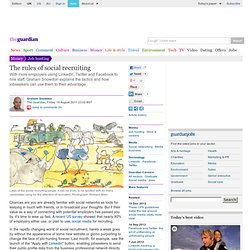
But if their value as a way of connecting with potential employers has passed you by, it's time to wise up fast. A recent US survey showed that nearly 90% of employers either use, or plan to use, social media for recruiting. In the rapidly changing world of social recruitment, barely a week goes by without the appearance of some new website or gizmo purporting to change the face of job-hunting forever. Last month, for example, saw the launch of the "Apply with LinkedIn" button, enabling jobseekers to send their public profile data from the business professional network directly to an employer.
Reports of the death of the traditional paper CV may be premature, but clearly it is becoming an increasingly less influential part of the jobseeker's armoury. But what does it all mean for jobseekers? Facebook and LinkedIn could lead to your next job. By JONDI GUMZ Posted: 11/09/2011 01:30:42 AM PST SCOTTS VALLEY -- All this year, recruiter Ken Winters told job hunters they need to be on LinkedIn.com to be seen by employers.
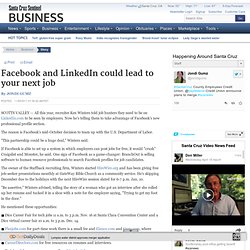
Now he's telling them to take advantage of Facebook's new professional profile section. The reason is Facebook's mid-October decision to team up with the U.S. Department of Labor. "This partnership could be a huge deal," Winters said. If Facebook is able to set up a system in which employers can post jobs for free, it would "crush" Craigslist and Monster, he said. The owner of the Staffback recruiting firm, Winters started HireWire.org and has been giving free job-seeker presentations monthly at GateWay Bible Church as a community service.
"Be assertive," Winters advised, telling the story of a woman who got an interview after she rolled up her resume and tucked it in a shoe with a note for the employer saying, "Trying to get my foot in the door. " Employers using social media to find workers. What should my Social media recruiting strategy,.. DO? The more we peel back the onion the clearer and simple the reason for a Social Media Recruiting Strategy (SMRS) becomes.
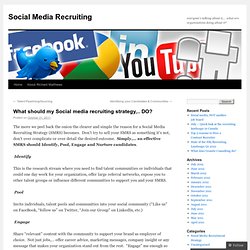
Don’t try to sell your SMRS as something it’s not, don’t over complicate or over detail the desired outcome. Simply,… an effective SMRS should Identify, Pool, Engage and Nurture candidates. Identify This is the research stream where you need to find talent communities or individuals that could one day work for your organization, offer large referral networks, expose you to other talent groups or influence different communities to support you and your SMRS.
Pool Invite individuals, talent pools and communities into your social community (“Like us” on FaceBook, “follow us” on Twitter, “Join our Group” on LinkedIn, etc.) Engage. PR Guide to Hired. Six social media recruiting mistakes to avoid. With more and more companies looking to use social media, it's no surprise that more and more of them are recruiting individuals for specialist social media job roles.
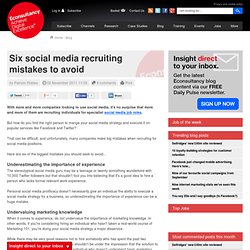
But how do you find the right person to mange your social media strategy and execute it on popular services like Facebook and Twitter? That can be difficult, and unfortunately, many companies make big mistakes when recruiting for social media positions. Here are six of the biggest mistakes you should seek to avoid... Underestimating the importance of experience The stereotypical social media guru may be a teenage or twenty-something wunderkind with 10,000 Twitter followers but that shouldn't fool you into believing that it's a good idea to hire a person who lacks formal relevant work experience.
Personal social media prolificacy doesn't necessarily give an individual the ability to execute a social media strategy for a business, so underestimating the importance of experience can be a huge mistake. Hiring before you're ready. Here is proof that social recruiting is right here, right now! Virtual Fairs Offer Real Jobs. What if Recruiters Stopped Using Social Media. How employers use social media to check up on potential hires - Blogs. So you’ve hit ‘Submit’ and just sent your resume and cover letter to a potential employer, hoping to get a call back, an interview and eventually a new job.
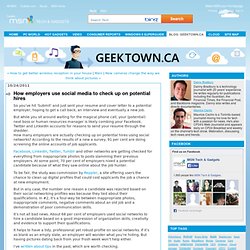
But while you sit around waiting for the magical phone call, your (potential) next boss or human resources manager is likely combing your Facebook, Twitter and LinkedIn accounts for reasons to send your resume through the shedder.How many employers are actually checking up on potential hires using social networks? According to the results of a new a survey, 91 per cent are doing screening the online accounts of job applicants. Facebook, LinkedIn, Twitter, Tumblr and other networks are getting checked for everything from inappropriate photos to posts slamming their previous employers.
At some point, 70 per cent of employers nixed a potential candidate because of what they saw online about the job hunter. It’s not all bad news. Social Media Plays Bigger Role in Hiring and Recruitment. Job-seekers looking to increase their chances of employment need to have their LinkedIn page up to snuff, new research suggests.
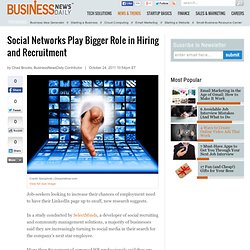
In a study conducted by SelectMinds, a developer of social recruiting and community management solutions, a majority of businesses said they are increasingly turning to social media in their search for the company's next star employee. More than 80 percent of surveyed HR professionals said they are using social networks to help them recruit candidates. Specifically, 79 percent search LinkedIn, 65 percent have a company page on LinkedIn, and 63 percent have a dedicated Facebook page established for jobs and careers.
Recruiting Innovation Summit. With Facebook’s Changes, Just Posting Jobs Is Not a Social Media Strategy. The Facebook changes announced last week at the developers conference, and those in the weeks before, have major implications for the way employers use the site to brand themselves and build relationships with potential candidates and future hires.
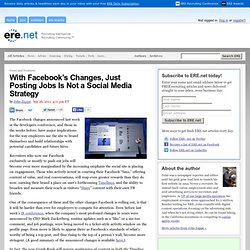
Recruiters who now use Facebook exclusively or mostly to push out jobs will become even more marginalized by the increasing emphasis the social site is placing on engagement. Those who actively invest in courting their Facebook “fans,” offering content of value, and real conversations, will reap even greater rewards than they do now, earning their brand a place on user’s forthcoming Timelines, and the ability to broaden and measure their reach as visitors “Share” content with their own FB friends. One of the consequence of these and the other changes Facebook is rolling out, is that it will be harder than ever for employers to compete for attention. That someone now “Likes” your post is another current measure of interest. Sirona Says. Most employers use social media for recruiting. Eighty-six percent of employers use social media, with 72 percent of employers using it for recruiting purposes, according to a survey conducted by SelectMinds.
Of the surveyed human resources professionals, 81 percent report using social networks to help them recruit candidates, with the two most popular sites being LinkedIn at 79 percent and Facebook at 63 percent. An additional 63 percent of respondents say their companies use corporate social networks for current employees while 40 percent purely employ them for recruiting. Another 33 percent of respondents have made alumni networks. Besides recruiting, the report reveals that social media is being used for training and learning at 53 percent, HR benefits and incentives at 52 percent, event information at 52 percent and accessing news at 52 percent.
Content Marketing & Digital PR.